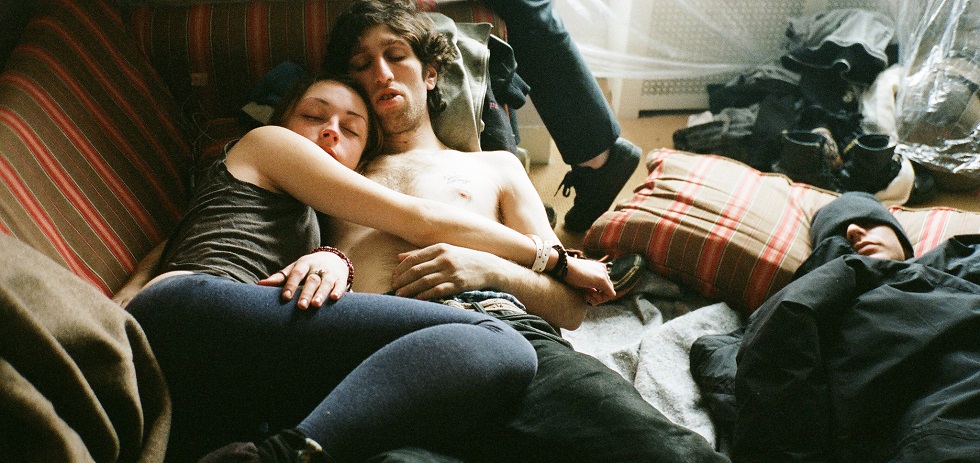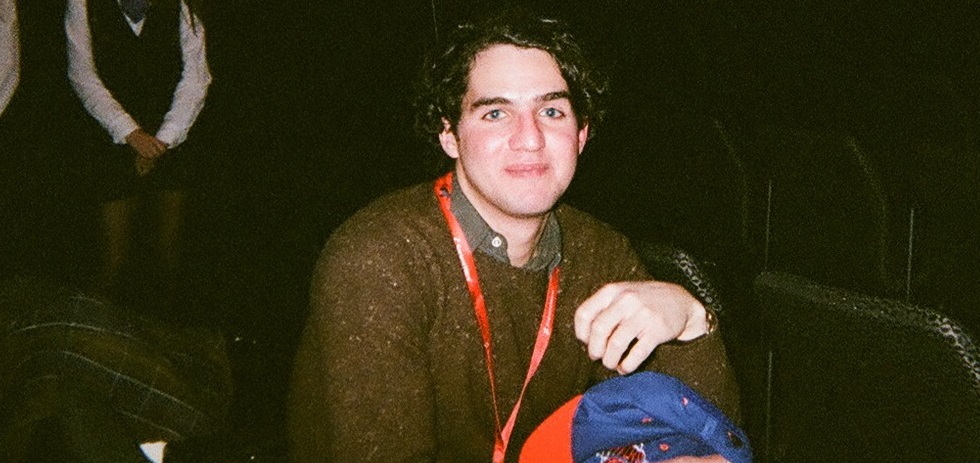The fictional films of Josh & Benny Safdie are marked by a sense of sculpting reality; whether it be lingering micro-details like a subway gust creating a tornado of stolen mail in Heaven Knows What, or the macro-details of autobiography, as in the filtering of their own experiences as children of divorce into 2009’s Go Get Some Rosemary. Their chance meeting of vagabond and heroin-addict Arielle Holmes on a NYC subway led them to jettison a different project entirely, and make the former film as a star vehicle for Holmes (the writings they based the film are also the subject of Holmes’ yet-to-be-released autobiography, Mad Love in New York City).
Due to similarly haphazard events, Josh wasn’t able to attend the Melbourne Film Festival this year – where Heaven Knows What plays alongside the first complete retrospective of the Safdies’ work – though I was fortunate enough to meet Benny during his stay in Melbourne, and talk to him about working with his brother and their various other collaborators.
Have you seen the Aussie film Pure Shit?
No!
It’s like the mother of all Australian junkie films.
Pure Shit… Good title. [Heaven Knows What] is getting released in Japan, and the title they’re gonna use in Japan translates to “Fuck You God”. We said that we should use that in America, and our distributor, Radius-TWC, was like “uhh… that’s not the best idea, it’ll alienate a lot of people”. The United States is a pretty religious country. But there’s something so interesting about that… ‘Fuck You God, for putting me here’, or ‘Fuck You God, I’m living this life’. That kind of dual perspective that you can take, that’s the movie. ‘Heaven knows what is going to happen to me tomorrow’, or ‘Heaven knows what’s going to happen to me tomorrow’… The slight inflection changes the meaning of the whole term. Either you’re giving it up to the future and the heavens for what’s gonna happen, or you’re just saying as a fact, you don’t know what’s gonna happen.
You’ve won the Tokyo Film Festival jury prize for the film last year, and it has pieces from a Japanese composer (Isao Tomita) used throughout. Do you feel a strong connection with Japan, as an artist?
I took some Japanese in high school, and my brother did also – he speaks a bit of it, actually. There’s something about the extremity of that culture, everything’s to an extreme. [For instance], they love hi-fi systems, they love good music, so what they’ll do is they’ll have a café that has a giant – like, literally from floor to the ceiling – a giant speaker, and all they’ll do is play records and drink tea and coffee, and you’ll just listen – you’re not allowed to talk. And it’s a whole café dedicated to that! That’s how far they’ll take their indulgences, and what they love… it’s a city of the future, they’ve figured out how to live in the future. And there’s something endlessly inspiring about that.
What Tomito was doing [with the score], and what Wendy Carlos and other composers before him did – was taking this classical music and making it alien, but Tomito takes it to another level… it’s so caustic at times. And he’s using the most beautiful, loving music ever – Debussy – and it’s just incredible to hear it through that lens. And that’s what the movie is too.
The reviews I’ve read of Heaven Knows What have been mentioning how ‘naturalistic’ it is, so it was a surprise to me how stylised it actually is.
That’s what I was saying to the publicist earlier. If the initial response to ‘how are we going to capture this group?’ was, y’know, handheld, nitty-gritty, we’ll be right next them… it would’ve made our lives easier, it would’ve been faster, we would’ve been able to steal a lot more locations without permission. But we didn’t wanna do that. What we wanted was a little bit of a distance from that world. Josh had been hanging out with these people for eight months, nine months, and he was very close, and I’m coming from a difference perspective, of looking out in, and seeing certain things he wasn’t able to because he was living it. And [Ronald Bronstein], who we wrote and edited the film with, he hadn’t seen any of these people, se he was writing from a point of complete isolation. Taking these perspectives and mixing them together is what gives the film it’s feeling, and having the camera very far away kind of allowed us to have that distance. And that’s a very formalist thing to do, to put the camera on a tripod and film it. So it’s crazy to me that people still say to me it feels like a documentary. It’s just a matter of the emotional intensity. It feels so real, these performances feel so real, and everybody looks so real… they just assume that’s how it is. A lot of [the film] comes across as this kind of surveillance. But we had two cameras, and we were orchestrating these things to such a degree, and scripting them, and it’s just crazy that you do all this work and it ends up disappearing. But that’s the goal. It’s just funny, I wonder what people would’ve thought if the film was shot like a documentary.
I get the impression that you have a real affinity with horror films; did you and Josh grow up with them?
Not really, no. This is a horror film to some people, and I guess the electronic score is a huge part of that.
I thought of The Texas Chainsaw Massacre a lot; the fact that it ends in daylight…
…and on the side of the highway and all that. There’s something interesting about horror films, where you’re just kind of holding your breath the whole time – the great ones.

Could you talk a little bit about the collaboration with your cinematographer, Sean Price Williams?
It’s interesting; him and Josh were always talking about the ‘opera’ of long lens. He’s very good with filters, and messing with the image. He sees so many movies, and he’s always pushing the limits of what you can do to something. We worked with him before on a short, The Black Balloon, and we were experimenting with really long lenses in that also, so that was the beginning of that, and Midnight Cowboy was a big influence on that too.
The biggest influence of the film of it all is Arielle Holmes (the film’s subject and lead actress), of course, who you came to by accident. What was the experience like of discovering her?
Josh showed me a picture of when he saw her on the train that day, and I thought, wow, she’s pretty incredible-looking. He’d be hanging out with her and her friends every night, til four in the morning, becoming her friend… then he started having her write her stories down, about what it was like to live on the street, and she’d write her stories down in Apple stores, and before you know it, she’d written down 180 pages. And we’re reading it, thinking ‘wow, this is pretty poignant, and I’ve never seen this perspective before’. And Josh was all ‘we’ve gotta make a movie about her…’ But me and Ronnie were like, ‘how different can it be?’ There’ve been a lot of movies about this subject matter, how can you make it different? And reading her story, the way she described people, the names she had for them, the way she described time – it was just this nothing. Something she’d described that happened a week ago felt like it happened years ago. It was this weird expansion of time, which was both inspiring and frightening. That all kind of led to us making this movie, and that was why she was going to play herself in the film.
How many full retrospectives have you had of your work? Or it this the first one?
This is actually the first full one. It’s weird, because we’re still making movies, and we’re not 80 years old, you know. (laughs) It’s weird, to have something like this that and think ‘huh, we’ve actually done a lot…’, and that’s kinda cool. But we still wanna make more, and we’re not in any way comfortable with the movies we’re making. We’re always learning from each thing to the next. It’s interesting, and weird, because ‘retrospective’ usually means you’re done. So I hope that’s not the case.
Heaven Knows What is currently playing at Melbourne International Film Festival along with a restrospective of Josh and Benny Safdie’s other films. It is also playing at the Sydney Underground Film Festival later this year.
